The Chautang is a seasonal river, originating in the Sivalik Hills, in the Indian state of Haryana. The Chautang River is a tributary of the Sarsuti river which in turn is a tributary of the Ghaggar river.[1][2]
| Chautang River | |
|---|---|
 | |
 Ghaggar-Hakra ("Sarasvati") rivers and tributaries | |
| Location | |
| Country | India |
| Physical characteristics | |
| Source | |
| • location | Shivalik Hills, Himachal Pradesh |
| Discharge | |
| • location | Ghaggar river in Haryana |
Origin and route
editThe Chautang river is a seasonal river in the state of Haryana, India. It is theorized by some to be a remnant of the ancient river Drishadvati.[3] It joins the Ghaggar-Hakra River east of Suratgarh in Rajasthan.[4] According to McIntosh, this river was one of the main contributors to this river system until the Yamuna changed its course.[3] However, according to Giosan, the Chautang is a rain-fed river, and the Yamuna changed its course towards east some 50,000 to 10,000 years ago, and didn't pour any water into it for the last 10,000 years.[5][need quotation to verify] Hansi Branch of Western Yamuna Canal is palaeochannel of this river.
Firuz Tughluq ( A.D. 1351-1388) did not do what his predecessors had done. He reduced land revenue, exempted the peasants of several taxes and providing them many facilities. He took out a canal from the Yamuna which entered the district at Anta (tahsil Safidon) and thence flowing through the present Jind District from east to west in the line of the old Chautang river passing the town of Safidon, Dhatrath and Jind and reached Hisar.[6] This branch was built in the paleochannel of seasonal Chautang river which is a relict of Drishadvati river flowing from Kaithal to Hisar district, passing through the towns of Jind, Hansi, Hisar, largest Indus Valley civilization site of Rakhigarhi and ancient Agroha Mound. Drishadvati river itself was a tributary of the Ghaggar-Hakra River.[7]
See also
edit- Western Yamuna Canal, branches off Yamuna river
- Markanda river, a tributary of Sarsuti
- Dangri, a tributary of Sarsuti
- Sarsuti, a tributary of Ghaggar-Hakra River
- Kaushalya river, a tributary of Ghaggar-Hakra River
- Sutlej, a tributary of Indus
- Ganges
- Indus
References
edit- ^ AmbalaOnline - Rrvers of Ambala
- ^ Chopra, Sanjeev (25 September 2010). "Overflowing Ghaggar, Tangri inundate some villages along Punjab-Haryana border". The Indian Express. Retrieved 9 April 2017.
- ^ a b McIntosh, Jane (2008). The Ancient Indus Valley: New perspectives. Bloomsbury Academic. ISBN 9781576079072. Retrieved 18 February 2014.
- ^ Climates, Landscapes, and Civilizations. John Wiley & Sons. 9 May 2013. ISBN 9781118704431. Retrieved 18 February 2014.
- ^ Giosan, Liviu; et al. (2012). "Fluvial landscapes of the Harappan civilization". PNAS. 109 (26): E1688 – E1694. doi:10.1073/pnas.1112743109. PMC 3387054. PMID 22645375.
- ^ "District Census Handbook – Jind 2001" (PDF). 2001. Archived (PDF) from the original on 12 April 2021.
- ^ "ASI Report on Rakghigrahi excavation" (PDF). Archived (PDF) from the original on 19 March 2015.